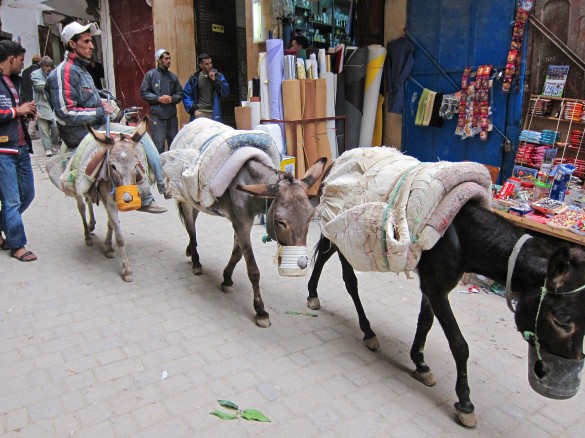Below me men dance in a honeycomb of vats, filled with a sludge of pigeon manure. With their bare toes they are kneading the pelages of cows and sheep, before dying them in tubs of saffron and poppies. Because of the stench, I breathe through my mouth, passing by heaps of putrefied fells. Hair is loosened with urine and salt, before teams scud the coats with dulled tannery knives.
After they’re cleaned, the hides are lugged to neighboring terrace rooftops, frosted with curls of shorn wool. In the distance, they dot the foothills with a kaleidoscope of hues. Once dried, grizzled mules haul the skins to the covered markets, where they’re stitched into leather products and then sold.


I sat down to speak with Muhammed B., a vendor who owns an antique gallery full of fine tapestries, daggers and polished amulets. He explained to me that he knows that foreigners are reaping huge profits on reselling his goods. He welcomes the interactions, he tells me in precise English. He likes to see whom he is dealing with after all.
“We’ve been in Fez for generations and hotels in L.A. contact me to decorate. I enjoy it when customers who I knew years ago come back because they remember my furniture.”
He pulls out a worn, coveted guestbook and I see the heavy scrawl in various languages.
“My international buyers,” he boasts with pride, bowing before a photo of his father, hanging beneath framed pages of the Koran.
“These clients find my family. It is my art that decorates their walls.”
I am squeezing the collapsed crimson ottomans like they are accordions, trying to gage their size and structure.
“You like that?” he asks. “I go into business with you. You buy two and want more, I ship them discount price.”
I glance up to meet his languid gaze.
“No pressure,” he says, holding up his hands. “Quality sells itself. Besides, hassling is not my style.”
He casually hands me another color.
“I only ship five minimum, though.”
“I just bought a pouf in Marrakech,” I explain, marveling at how supple his leather is, without lines or cracks in the sides.
“Mine are cowhide, truly the best. And I only use natural products in tanning.”
He hands me pendant and tells me it’s a gift. He then ties a bracelet around my wrist, brightly embroidered with his name.
“My son knows email,” he says in a hushed voice. “You might just change your mind.”
The muezzin call to prayer interrupts us as he reaches for my hand. He is so happy I’ve come by today, he says. He assures me that the most refined people live here.
“I wouldn’t want to be anywhere else,” he sighs.
I suddenly admire his acumen and heave two wilted shells onto the counter. I watch him expertly wring them into tight bundles for my suitcase.
“You stuff them, you’ll be back,” he knowingly nods, handing me a pile of business cards.
On my stroll back, I peruse stalls of ceramics, passing severed camel heads, bouquets of lamb legs, giant cleaved hooves, and skulls thick with roasted brains. I’m about to purchase a pot when I’m told that the reason my choice is more expensive is that the dish is “old.” I look around at the crumbling turrets, the patina on the weathered spires, the gated-off piles of rubble and corroded pipelines. This, I suddenly know, is part of a slick sales routine. The woman who runs the store shakes her head when I approach and walks my container back to its home mantle.
Oooooold, she reiterates, drawing out the word as though speaking to a child. Something has been definitely been lost in the translation.
We smile and step around each other and I handle a few of the shiny wares. Nice, I say, as I run my fingers over the chosen bowl again. She signals toward another stockpile and stands to block the designated shelf. I am confused by her response and unsure of what to do.
Finally a hovering boy in a soccer jersey lets me in on the secret: the plating is endowed with significance. Each year designs are soldered differently and this one is from six years ago. She only has one left and I’d said three in the beginning. I give my boyfriend a smirk. We hadn’t known they’d been listening.
I pick up three jobbanas from the ledge she’d pointed to and wait as she wraps them in newspaper. Then I hand her the much-desired jar. She holds up four fingers and starts, her dour face melting into a wide toothless grin.
Fassis sit poised at this critical crossroads, gingerly balanced in the swells of strife. Amidst waves of political turmoil, they are simultaneously humble and confident in their clout. Armed with time-honored wisdom, they are hopeful and resilient, striving to honor their past without being left behind. It’s inevitable the city will evolve as regimes restructure. It’s equally important the artists negotiate the change.